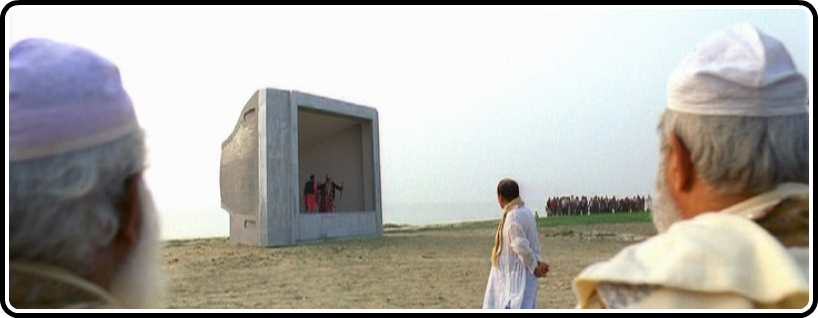
As a highly impressionable kid growing up with a subliminal fixation on pop culture of the late 60s and early 70s, I didn’t know all that much about the nation of Bangladesh. What I did know was that it was poor – the image of that piteous scrawny kid holding his begging bowl that was featured on the original album packaging of The Concert for Bangladesh has ever since flashed into my mind’s eye at the mention of that country. Since then, I’ve learned a bit more about the place, as additional information trickled in through the media stream – a significant percentage of my clothing has been made there, it’s a densely populated region (currently ranked as the 8th most populous nation on the planet, even though it’s not very large), and probably most significantly for my purposes here, it’s home to a thriving film industry. (No wonder – all those people living together in such close proximity need some kind of diversion.) The great auteur Satyajit Ray, while not being regarded as a Bengali film maker himself (he was based in the Indian city of Kolkata), certainly had a strong interest in the region as well through his ancestral ties and the compelling drama of the Muslim/Hindu conflicts that have shaped the history of Bangladesh. Two of the films I’ve reviewed from last month’s Late Ray Eclipse Series release (The Home and the World and An Enemy of the People) each have a direct bearing on Bengali culture and politics. So as I was reviewing the screener options presented to me for this year’s Portland International Film Festival, this offering from Bangladesh, titled Television, definitely intrigued me. It tells the story of how, “on religious grounds, a local community leader, Chairman Amin, bans every kind of image in his little village, including televisions and mobile phones. He even declares that imagination is sinful as it leads one into prohibited territory. His order is met with revolt, even within his own family, and the once peaceful village is riven by the decision. ” (Quoted text from the festival brochure).
Promising a blend of comedy, pathos, exotic local flavor and insightful social commentary, I’m happy to report that Television delivers on its assurance of giving Western viewers something unique, memorable and emotionally provocative. Just going off the description cited above, I figured if a movie can make me laugh and empathize with a tribal chief who takes it upon himself to oppress his people through rampant censorship that amounts to heavy-handed mind control, that would be a significant achievement in itself, since I generally don’t find much to admire about such characters in real life. As it turns out, the Chairman, commonly referred to as “Uncle” with a mixture of reverence and fear by those subject to his authoritarian whims, is really not the kind of hateful bastard that those of us living in more liberally tolerant societies might assume he would be. He’s just a guy who, in his own way, is trying to do the right thing, following the dictates of his conscience as he bears the weight of a hefty cultural legacy that finds itself besieged by the invasion of new technologies that prove too tempting to resist, especially for the younger and more curious residents of his village. Furthermore, he’s actually respectful of the boundaries of his religious faith, recognizing that his edicts can only apply to those who aspire to be devout Muslims; for the Hindus who dwell among them, his decrees have little bearing – an interesting concept that those who seek to establish their own religiously pure culture zones in this country might want to consider as they pursue their respective political agendas.
As the trailer below indicates, Television also incorporates several other perspectives (class, gender, generational, etc.) in its depiction of the conflict between old traditional taboos and the new possibilities offered by the internet and mobile telecommunications.
Much of the humor consists of how creatively legalistic people can become when they’re faced with the challenge of finding their way around forbidden practices to achieve their desired goals. (For example, watching video through reflected images in a mirror, rather than the actual screen itself, or acquiring a passport photo when one doesn’t believe it’s proper to sit in front of the camera.) The audio signals so familiar to us podcasters who rely on Skype to host and record our remote conversations pop up in delightful and amusing contexts here, creating an instant bond of shared understanding with those who live on the other side of the world. We see that the differences between our culture and theirs are not so insurmountable after all. In fact, the basic story could play itself out in many other places on the globe, but there is an undeniable charm in learning more about what goes on in this (literal) backwater of human civilization. I’ve enjoyed all the opportunities to preview a handful of films for this year’s PIFF, but without a doubt, Television is the one that I consider the most winsome, humane and illuminating. We need more of this kind of cross-cultural dialogue, since it is so easy to look with disdain and suspicion on the media stereotypes of “intolerant Muslim extremists” and all the baggage such language implies. I hope the film draws a full and appreciative audience.
Television will be shown on Saturday, February 15 at 9 PM at the Whitsell Auditorium and on Monday, February 17 at 5 PM at Cinema 21 (small theaters)



![Bergman Island (The Criterion Collection) [Blu-ray]](https://criterioncast.com/wp-content/uploads/2022/11/bergman-island-the-criterion-collection-blu-ray-400x496.jpg)
![This Is Not a Burial, It’s a Resurrection (The Criterion Collection) [Blu-ray]](https://criterioncast.com/wp-content/uploads/2022/11/this-is-not-a-burial-its-a-resurrection-the-criterion-collection-blu-ray-400x496.jpg)
![Lars von Trier's Europe Trilogy (The Criterion Collection) [The Element of Crime/Epidemic/Europa] [Blu-ray]](https://criterioncast.com/wp-content/uploads/2022/11/lars-von-triers-europe-trilogy-the-criterion-collection-the-element-of-400x496.jpg)
![Imitation of Life (The Criterion Collection) [Blu-ray]](https://criterioncast.com/wp-content/uploads/2022/11/imitation-of-life-the-criterion-collection-blu-ray-400x496.jpg)
![The Adventures of Baron Munchausen (The Criterion Collection) [4K UHD]](https://criterioncast.com/wp-content/uploads/2022/11/the-adventures-of-baron-munchausen-the-criterion-collection-4k-uhd-400x496.jpg)
![Cooley High [Criterion Collection] [Blu-ray] [1975]](https://criterioncast.com/wp-content/uploads/2022/11/cooley-high-criterion-collection-blu-ray-1975-400x496.jpg)